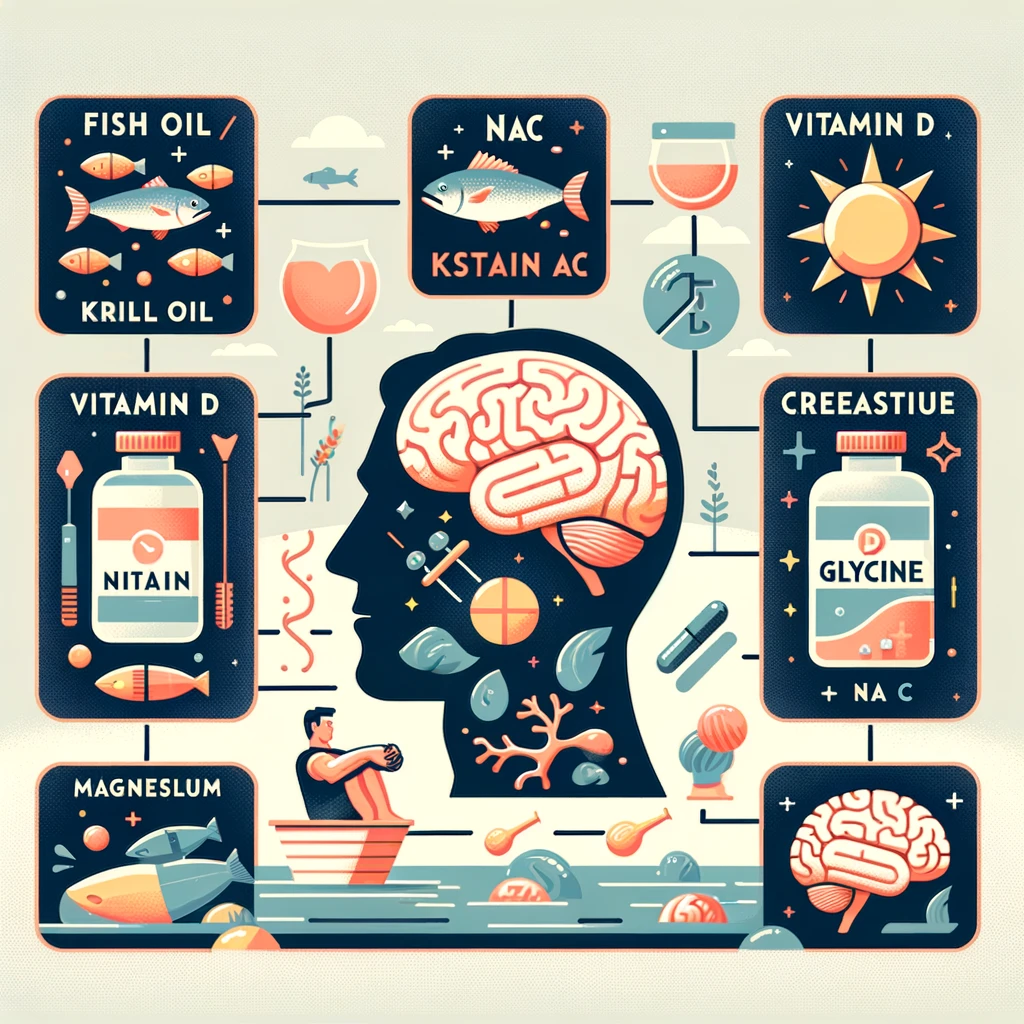Creatine’s benefits for mental health are something that is not talked about enough.
Mental health is an essential component of our overall well-being.
In this day in age, mental health is talked about a lot but we don’t talk about more natural ways of trying to help with mental health.
Supplements like creatine have an overall positive impact on mental health.
This article aims to shed light on the mental health benefits of creatine, debunking common myths and guiding you on its optimal use.
First though:
Disclaimer: Please note that I am not a healthcare professional or doctor. The content of this article is intended for informational purposes only and should not be taken as medical advice. Individual health needs and responses to supplements can vary, so professional guidance is essential for optimal health and safety.
What is Creatine?
People hear creatine and think it’s a drug or something that if they take they’re not considered natural anymore.
I don’t know where this notion came from, to begin with, but it’s nonsense. So let’s get that out of the way.
Creatine is an essential component of our overall well-being and is a vital aspect of our daily lives.
Creatine is a naturally occurring compound found in small amounts in certain foods and synthesized in the human body.
Primarily stored in muscles, it plays a crucial role in energy production, particularly during high-intensity activities.
However, its benefits extend beyond physical performance, encompassing various aspects of cognitive function and brain health.
Common Misconceptions: Is Creatine Bad for You?
There’s a common misconception that creatine is harmful, especially for the kidneys and liver.
However, creatine is one of the most studied supplements out there. The research indicates that creatine is safe for most people when used responsibly.
It’s important to note that while creatine is generally safe, individuals with pre-existing kidney or liver conditions should consult with a healthcare professional before starting supplementation.
If you are a healthy individual, you should be able to take it without issue.
Effects of Creatine Overall
Creatine’s role in the body is multifaceted, impacting various physiological processes, most notably energy production.
To understand the comprehensive effects of creatine, it’s crucial to explore its relationship with ATP (Adenosine Triphosphate), the primary energy currency of the cell.
Creatine and ATP Production
ATP serves as the main energy source for most cellular functions, including muscle contractions and brain activities.
However, ATP stores are limited and can be rapidly depleted during high-intensity activities.
This is where creatine comes into play.
Creatine phosphate, a form of stored energy in the muscles, donates a phosphate group to ADP (Adenosine Diphosphate), regenerating ATP.
This process is critical during short bursts of intense physical or mental activities, as it provides immediate energy to maintain performance levels.
By facilitating the rapid regeneration of ATP, creatine supplementation improves strength, power, and endurance.
This enhancement is particularly noticeable in activities requiring quick and explosive movements, such as sprinting and weightlifting.
Moreover, creatine reduces muscle fatigue by buffering lactic acid build-up, allowing for longer and more effective training sessions.
Creatine’s Benefits and Impact on Mental Health
Creatine plays a crucial role in maintaining energy reserves in the brain and enhancing cognitive function.
As mentioned before, the brain requires a significant amount of ATP for optimal functioning.
By ensuring a steady supply of ATP, creatine can enhance various cognitive functions such as memory, attention, and speed of processing.
Studies have shown that creatine supplementation can particularly benefit cognitive performance under conditions of sleep deprivation or mental fatigue.
Mood Regulation and Mental Disorders
Research also suggests a role for creatine in mood regulation.
Some studies indicate that creatine may have antidepressant properties. This is thought to be due to its ability to increase energy availability in the brain, which could affect neurotransmitter systems involved in mood regulation, such as serotonin and dopamine.
Neuroprotective Effects
Creatine’s neuroprotective properties are of significant interest in the context of mental health.
By maintaining cellular energy levels and reducing oxidative stress, creatine can help protect neurons from damage.
This aspect is particularly relevant in neurodegenerative diseases like Parkinson’s and Huntington’s disease, where creatine supplementation has been studied for its potential to slow disease progression and mitigate cognitive decline.
How Often Should You Take Creatine
You should be taking at least 5g of creatine every day.
Regardless if it’s your day off or not, getting creatine every day is important and necessary.
Consuming more than 5g can cause gastro effects though.
As well, the time of day doesn’t matter. However, I would suggest using it at the same time every day to avoid any gastro effects.
Brands of Creatine
The main creatine I recommend is creatine monohydrate. It is the most well-researched supplement.
Anyone trying to sell you a special creatine is trying to get you to buy something you don’t need.
Creatine is fairly cheap and you can buy it in bulk.
Brands I use:
Again, anything that’s super expensive is not worth it overall. It’s just creatine and you can find it in many places for cheaper.
Final Thoughts
Creatine, while widely known for its physical benefits, is a powerhouse supplement for mental health as well.
Taking creatine every day is the best way to get optimal results from it overall.
Take your creatine!




